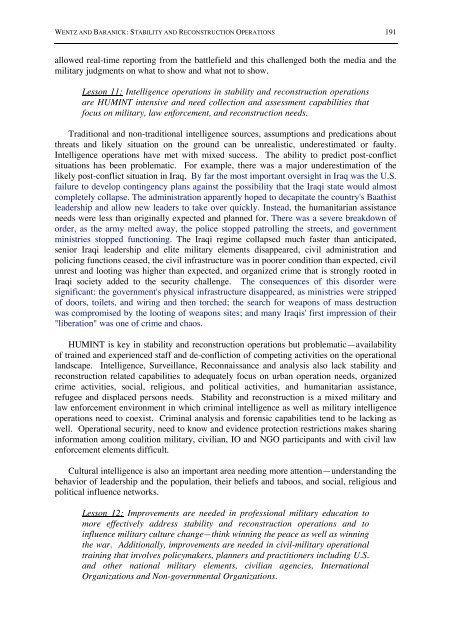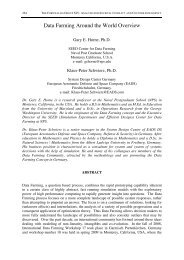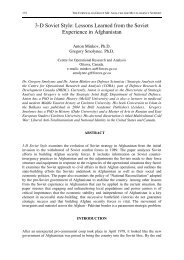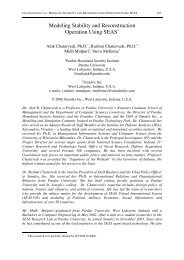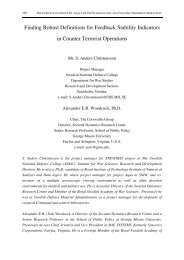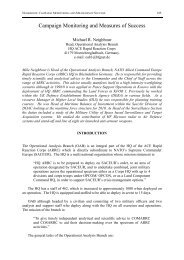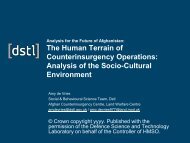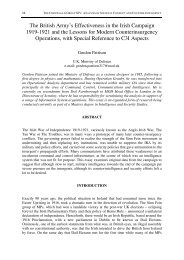Stability and Reconstruction Operations: What ... - Cornwallis Group
Stability and Reconstruction Operations: What ... - Cornwallis Group
Stability and Reconstruction Operations: What ... - Cornwallis Group
You also want an ePaper? Increase the reach of your titles
YUMPU automatically turns print PDFs into web optimized ePapers that Google loves.
WENTZ AND BARANICK: STABILITY AND RECONSTRUCTION OPERATIONS 191<br />
allowed real-time reporting from the battlefield <strong>and</strong> this challenged both the media <strong>and</strong> the<br />
military judgments on what to show <strong>and</strong> what not to show.<br />
Lesson 11: Intelligence operations in stability <strong>and</strong> reconstruction operations<br />
are HUMINT intensive <strong>and</strong> need collection <strong>and</strong> assessment capabilities that<br />
focus on military, law enforcement, <strong>and</strong> reconstruction needs.<br />
Traditional <strong>and</strong> non-traditional intelligence sources, assumptions <strong>and</strong> predications about<br />
threats <strong>and</strong> likely situation on the ground can be unrealistic, underestimated or faulty.<br />
Intelligence operations have met with mixed success. The ability to predict post-conflict<br />
situations has been problematic. For example, there was a major underestimation of the<br />
likely post-conflict situation in Iraq. By far the most important oversight in Iraq was the U.S.<br />
failure to develop contingency plans against the possibility that the Iraqi state would almost<br />
completely collapse. The administration apparently hoped to decapitate the country's Baathist<br />
leadership <strong>and</strong> allow new leaders to take over quickly. Instead, the humanitarian assistance<br />
needs were less than originally expected <strong>and</strong> planned for. There was a severe breakdown of<br />
order, as the army melted away, the police stopped patrolling the streets, <strong>and</strong> government<br />
ministries stopped functioning. The Iraqi regime collapsed much faster than anticipated,<br />
senior Iraqi leadership <strong>and</strong> elite military elements disappeared, civil administration <strong>and</strong><br />
policing functions ceased, the civil infrastructure was in poorer condition than expected, civil<br />
unrest <strong>and</strong> looting was higher than expected, <strong>and</strong> organized crime that is strongly rooted in<br />
Iraqi society added to the security challenge. The consequences of this disorder were<br />
significant: the government's physical infrastructure disappeared, as ministries were stripped<br />
of doors, toilets, <strong>and</strong> wiring <strong>and</strong> then torched; the search for weapons of mass destruction<br />
was compromised by the looting of weapons sites; <strong>and</strong> many Iraqis' first impression of their<br />
"liberation" was one of crime <strong>and</strong> chaos.<br />
HUMINT is key in stability <strong>and</strong> reconstruction operations but problematic—availability<br />
of trained <strong>and</strong> experienced staff <strong>and</strong> de-confliction of competing activities on the operational<br />
l<strong>and</strong>scape. Intelligence, Surveillance, Reconnaissance <strong>and</strong> analysis also lack stability <strong>and</strong><br />
reconstruction related capabilities to adequately focus on urban operation needs, organized<br />
crime activities, social, religious, <strong>and</strong> political activities, <strong>and</strong> humanitarian assistance,<br />
refugee <strong>and</strong> displaced persons needs. <strong>Stability</strong> <strong>and</strong> reconstruction is a mixed military <strong>and</strong><br />
law enforcement environment in which criminal intelligence as well as military intelligence<br />
operations need to coexist. Criminal analysis <strong>and</strong> forensic capabilities tend to be lacking as<br />
well. Operational security, need to know <strong>and</strong> evidence protection restrictions makes sharing<br />
information among coalition military, civilian, IO <strong>and</strong> NGO participants <strong>and</strong> with civil law<br />
enforcement elements difficult.<br />
Cultural intelligence is also an important area needing more attention—underst<strong>and</strong>ing the<br />
behavior of leadership <strong>and</strong> the population, their beliefs <strong>and</strong> taboos, <strong>and</strong> social, religious <strong>and</strong><br />
political influence networks.<br />
Lesson 12: Improvements are needed in professional military education to<br />
more effectively address stability <strong>and</strong> reconstruction operations <strong>and</strong> to<br />
influence military culture change—think winning the peace as well as winning<br />
the war. Additionally, improvements are needed in civil-military operational<br />
training that involves policymakers, planners <strong>and</strong> practitioners including U.S.<br />
<strong>and</strong> other national military elements, civilian agencies, International<br />
Organizations <strong>and</strong> Non-governmental Organizations.


